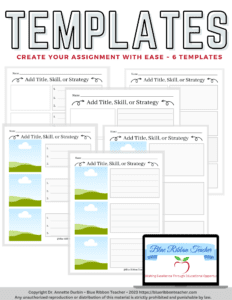Action Research: Question
Question: How can teachers improve student engagement and motivation in assessment and increase achievement?
Increasing student motivation and engagement are areas every educator wants to see increase. The question is ~ How can educators effectively increase these traits?
I decided to take an opportunity to do some action research and was pleasantly surprised with the results. Read on to learn how my students experienced success!
Student Engagement and Motivation Assessment Converns
It’s that time of the year when students are taking state and district assessments, end-of-quarter tests, or even course final exams. Testing is something that everyone needs to do for a variety of purposes. However, if your students are like mine, sometimes there is little motivation to take these tests.

I know testing can be a struggle. Some students do well in class on projects, discussions, and assignments and FAIL the test.
Other students don’t complete or participate in class assignments, but PASS the test. There is never a WIN-WIN!
What can educators do to ensure students demonstrate learning?
Engagement and Motivation: Perspectives
There are various perspectives on assessments. Typically . . . students hate them, and teachers and parents need them to monitor progress.
STUDENTS: Do your students enjoy taking tests? How many of them struggle? How many just don’t care about tests? What is the purpose of taking a test? Why do I need to test!?
TEACHERS: What types of assessments are students taking? Are there testing options? Do you take time to analyze the results? How do you use the results to guide your next instructional sequence?
PARENTS: Is my child learning? Is my child improving? What can I do to support my child?
Action Research: Assessment
As an educator, I had all the same challenges educators and parents face, same student, teacher, and parent perspectives. I wanted to figure out what I could do to change these students’ attitudes about testing so they could see the value and experience success.

Therefore, I decided to allow my students to redo lessons, quizzes, and tests to demonstrate learning. I wanted to find out if the students would take this opportunity to show me learning AND if this option would encourage, motivate, and help students become “owners” of their learning.
I allow my students several options to redo work with varied support and expectations. The number one key to all options ~ the student had to come to me and initiate the learning options.
Student Motivation and Engagement – Process
LESSONS: During the learning process, assignments are not graded in terms of meeting a standard, but in terms of monitoring progress towards meeting the standard. After students have had time to practice the skill, a graded assignment is given to monitor progress. If a student is not happy with the assignment grade, the student can redo this lesson. When a student chooses to redo a lesson, I will take time to provide 1:1 support during independent work time or recess, although I’ve also had students stay after school for additional support. If the student initiates this learning, I will make sure there is time to provide some reteaching.
QUIZZES/TESTS: When students have had ample time to practice concepts, it is time to demonstrate learning. Once the quiz/test is given and graded, students review current results. If the student doesn’t perform to his/her expectation, he/she has the option to demonstrate learning and improve his/her grade. After the student reviews lessons, quizzes, and asks me questions, the student writes me a letter detailing what he/she noticed about his/her errors and what has been done to prepare for the retake. Oftentimes, I’ll take some time to review with the student the overall concepts and then set up a time for the retake.
Conclusion about Student Engagement and Motivation
Action Research Conclusion: As a result of the extra support I provide and opportunities for students to demonstrate learning, the results have been positive. I found that students were motivated to excel by taking time to review lessons and retest. Students also took ownership of their learning not only in my class, but in other classes as well. Parents also told me how their students’ attitudes about testing changed. Students were no longer anxious about testing, but more relaxed, since there was an option for improvement.
Templates: Assessment and Lesson
One of the ways that I supported my students during the lesson and study reviews is using graphic organizers. Therefore, I created these templates that are perfect for creating assessments, games, assignments, reviews, lessons, and even center tasks. These templates were helpful for my students. Therefore, feel free to use this resource by editing the templates to fit your specific needs or print them off and use them as graphic organizers. I’m sure your students will be grateful, too.

Assessments: Changing Attitudes
I’ve seen students who initially “didn’t care” about their work change their attitude and “care” because they know they can do better. As a result of my action research, students began to work harder in class and prepare for the first assessment attempt. Students shared how they appreciated the opportunity to try again and they were less anxious about taking the test. Parents appreciate that I care about their children by allowing them opportunities to learn again and demonstrate that learning. I have always believed that learning doesn’t have to be the same way and at the same time for all students.
I know this is a “new way” of thinking, but I am in the business of ensuring each student that passes through my class LEARNS!! Honestly, this philosophy simply aligns with my perspective about differentiating instruction and differentiating assessment, including personalized learning.
Related Resources: Student Engagement and Motivation
Opportunities to support student’s needs through differentiating learning opportunities are beneficial for students. In the end, this is our goal for students – providing opportunities to demonstrate learning and experience success. Yes, even in failure, learning and success should be the outcome.
Tips for Allowing Test Retakes
Five Tools to Measure Classroom Learning
Final Thoughts About Student Engagement and Motivation in Assessments
Giving students an opportunity to redo lessons, quizzes, and tests is an option for students to not only demonstrate learning, but to increase motivation, engagement, and ownership of learning. Not all students will take advantage of this opportunity; however, those students who do are more motivated to achieve AND are advancing their learning. Isn’t that the goal of education? Why not give your students this option and see what happens? You just might be pleasantly surprised!
how to improve academic performance of weak students, how to increase student engagement in the classroom, student engagement and motivation in assessment




I can see this as being a very useful tool in the classroom at times ~ giving the opportunity to try again and learn from our mistakes. I don’t know that I think it should be employed with every test or quiz, but I do see its place in the process of learning.
Thanks for sharing your thoughts!!! Learning from personal mistakes is the most important learning resource.
Take care,
~Annette
Sometimes a student can get frustrated because they knew the answer but either marked something wrong or froze under the pressure of doing a test. Second chances can give people a chance to recollect their thoughts or a second opportunity to learn. I like that because it is better to give a child a second opportunity to learn that to say that they got it wrong and that is that. You seem like my kind of teacher.
Thanks, Dawnmarie! Second opportunities are always a great thing, regardless if one is in the classroom or experiencing life.
Thanks for stopping by!
~Annette
I agree 100% that re-takes should be allowed and even encouraged. Everyone learns at a different pace and in different ways, but we all like to “top” our previous efforts. I think it’s motivation to do the best you can and kids need that encouragement!
Hello Angela!!! I love your thinking!!! MOST want to do better with another try. Allowing this opportunity promotes motivation, self-confidence, and ownership of personal success.
Thanks for stopping by!!
~Annette
I always took my students that were below proficient on a test and retaught the concept for a week. We focused on which skills seemed to be missing, then I allowed the students to take the test again.
You are an amazing teacher, Meagan!!
Have a blessed day!
~Annette
I love this idea! Giving kids an opportunity to figure out where they went wrong, correct it, and learn while doing so (and getting a higher grade to boot) seems to make so much obvious sense…why aren’t more teachers/schools doing this?
Hello Michele, this is a shift in thinking about learning. It really comes down to philosophy. Kids want to learn, but don’t all learn in the same time or same way.
Have a great day!
~Annette
I love the idea of retakes, but also want a good attempt the first time…sometimes the test helps for understanding what you should be focusing on (not just for answers, but for concepts). Great post!
Thanks for your response, Tiffany!! I agree, students should put a solid attempt in the first time. Knowing that some students need more time to understand the concepts, this would be a reason to give students the opportunity to retest. I put the student in charge of this decision – ownership.
Take care,
~Annette
I would REALLY appreciate this if teachers offered this to my kids. My kids all learn so differently and most have significant anxiety, being trauma kids. I’d especially love this if a test retake still doesn’t show good results, but the teacher knows that the kid knows the material based on re-learning interactions
Karla, I agree!! Kids learn differently and demonstrate that learning in different ways, as shared in Gardner’s Multiple Intelligences (2008). The other point you mention about teachers knowing the kiddos. Yes, any great teacher is going to have a solid relationship and know if the student understands the concepts or does not, and work accordingly. I think there would be less anxiety if there was a different approach. Hoping your kiddos find success with demonstrating learning.
Thanks for your response!
~Annette